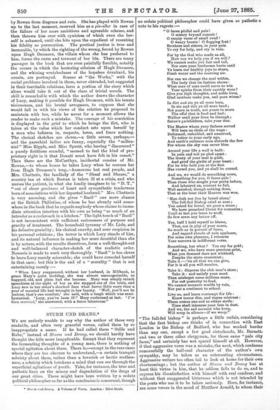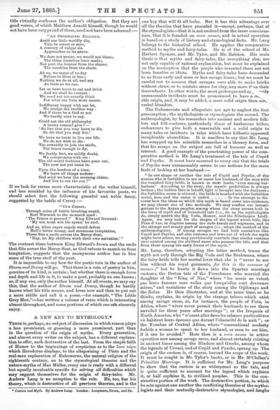MICA UND DRANG.* WE are entirely unable to say why
the author of these very readable, and often very graceful verses, called them by so inappropriate a name. If he had called them "Stifle and Ruhe," instead of Sturm und Drang, we should hardly have thought the title more inapplicable. Except that they represent the fermenting thoughts of a young man, there is nothing of special agitation about them. There is,—except in the rare cases where they are too obscure to understand,—a certain tranquil sobriety about them, rather than a feverish or hectic restlessness, a sobriety which betokens a mind that can see through the superficial agitations of youth. Take, for instance, the true and pathetic lines on the misery and degradation of the dregs of our great cities. These might have been written by a sedate political philosopher so far as the conclusion is concerned, though no sedate political philosopher could have given so pathetic a note to his regrets :— "0 faces pitiful and pale!
0 misery beyond conceit ! 0 empty verse of small avail !
0 weary hearts! 0 flagging feet ! Brothers and sisters, in your pain Ye cry for help, and cry in vain.
For by the God who made us all, How can we help you if we will ? We cannot make you fair and tall, Nor cure your loathsome hurts until Ye learn our healthy joys to share, Fresh water and the morning air.
Nor can we change the soul within, The body that its fashion shows : What care of ours could serve to win
Your spirits from their earthly woes ? Give you high thoughts, and noble lives, Glad mothers make you, and pure wives?
In dirt and sin ye all were born, In sin and dirt ye all were bred ; Not yours in truth, not yours to scorn The offal that is food and bed : Wallow until your lives be through ; Satan's goichildren, take your due.
The Master whom your fathers served Will bate no tittle of the wage : Deformed, enfeebled, and unnerved, Ye totter to your early age, And earth's embrace soon shrouds the few For whom the sky was never blue.
Around your life a wall is built : In pain and toil ye plod apart : The livery of your soul is guilt, And grief the girdle of your heart : For he who held you at the first Has cursed you, and ye shall be cursed.
And we, we would do something more, Something for you, 0 faces pale !
Than those who sought your paths before, And laboured on, content to fail, Well satisfied, though nothing done, That at the least their Heaven was won.
Man doth not live by bread alone,' The full-fed Bishop cried at ease ; You asked for bread, we gave a stone ; We have preached Christ for centuries ; Until at last you learn to scoff, So few seem any better off.
Yea, half I hold myself to blame, That, not in pity of your cause, So much as in pursuit of fame, And ragged shreds of vain applause, For mine own pleasure, I rehearse Your sorrows in indifferent verse.
Something, but what ? You cry for gold; And we, who have more precious grist, What you demand dare not withhold,
Despite the stern economist;
Take it :—'tis all that we can give, For it is all you will receive.
Take it : disperse the rich man's store; Take it : and satisfy your need. Then misbeget some millions more, For our posterity to feed.
We cannot measure worlds by rule, Nor put a continent to school.
Live on, and learn contempt for life : Know terror dim, and vague mistrust : There comes one end to either strife: Time shall inhearse your fate in dust. And we, the sad account who keep, Will weep in silence—if we weep."
"The full-fed bishop" is perhaps a little unfair, considering that the first bishop one thinks of in connection with East London is the Bishop of Bedford, who has worked harder than any one, except a few good sisterhoods, Mr. Barnett, and two or three other clergymen, for those same "pale city faces," and certainly has not spared himself at all. However, if that aggressive verse was a mistake, the next, which confesses remorsefully the half-real character of the author's own sympathy, may be taken as an extenuating circumstance. Aggressive writers too often fail to look at home for their own shortcomings ; but the author of Sturm und Drang has at least this virtue in him, that he seldom fails to do so, and to express his dissatisfaction with himself with real candour, and without that exaggerated bitterness which is not intended by the poets who use it to be taken seriously. Here, for instance, are some verses in the mood of Matthew Arnold, to whom their title virtually confesses the author's obligation. But they are good verses, of which Matthew Arnold himself, though he would not have been very proud of them, need not have been ashamed :- "AN OBERMAN= EPILOGUE.
Amid our little worldly din, Vain to arrest or save, A century of vulgar sin Approaches to its grave.
We dare not praise, we would not blame, The thing ourselves have made; Nor part the honour from the shame, The sunshine from the shade.
Ah no, we sages of to-day Refuse to bless or ban ; Nothing we do at all, and say As little as we can.
Let us have leave to eat and drink And we shall be content : We need not too exactly thick • For what our lives were meant.
Indifferent happy with our lot, We trudge the trodden way : And if there be a God or not We hardly care to say.
Could not the old philosophy
A better counsel give 2—
'So live that you may learn to die, So die that you may live.'
We have no heart to live our life, We do not wish to die : Too cowardly to join the strife, Not brave enough to fly.
We feebly fret, we mildly doubt", We compromise with sin : The old-world fashions have gone out, The new not yet come in.
Upon the borders of a time, We leave all things undone : God send we hear the morning chime, And live to see the sun !"
If we look for verses more characteristic of the writer himself, and less moulded by the influence of his favourite poets, we should select first the following graceful and noble fancy, suggested by the battle of Cressy :—
"OUR CRESSY.
Through noise of battle breaking round, Earl Warwick to the monarch sped : The Prince is pressed !' King Edward frowned : 'My son mist win his spurs,' he said.
And so, when eager angels would defeat Hell's bitter wrong, and strenuous temptation, There flits a smile across the Mercy-Seat, Nay, let My children work their own salvation.'"
The contrast there between King Edward's frown and the smile that flits across the Mercy-Seat, as God refuses to snatch us from temptation, suggests that the anonymous author has in him some of the true stuff of the poet.
It is impossible to say how far the poetic vein in the author of Sturm and Drang will go. That there is a vein of poetry in him, genuine of its kind, is certain; but whether there is enough force and depth and life in it, to make a poet, probably no one knows; or, if any one, only the author himself. At all events, we may say this, that the author of Sturm und Drang, though he hardly knows what his title means, and loves now and then to put out a mere riddle and call it a poem,—for example, "The Little Grey Man,"—has written a volume of verse which is interesting almost throughout, and some portions of which one call sincerely enjoy.



































 Previous page
Previous page